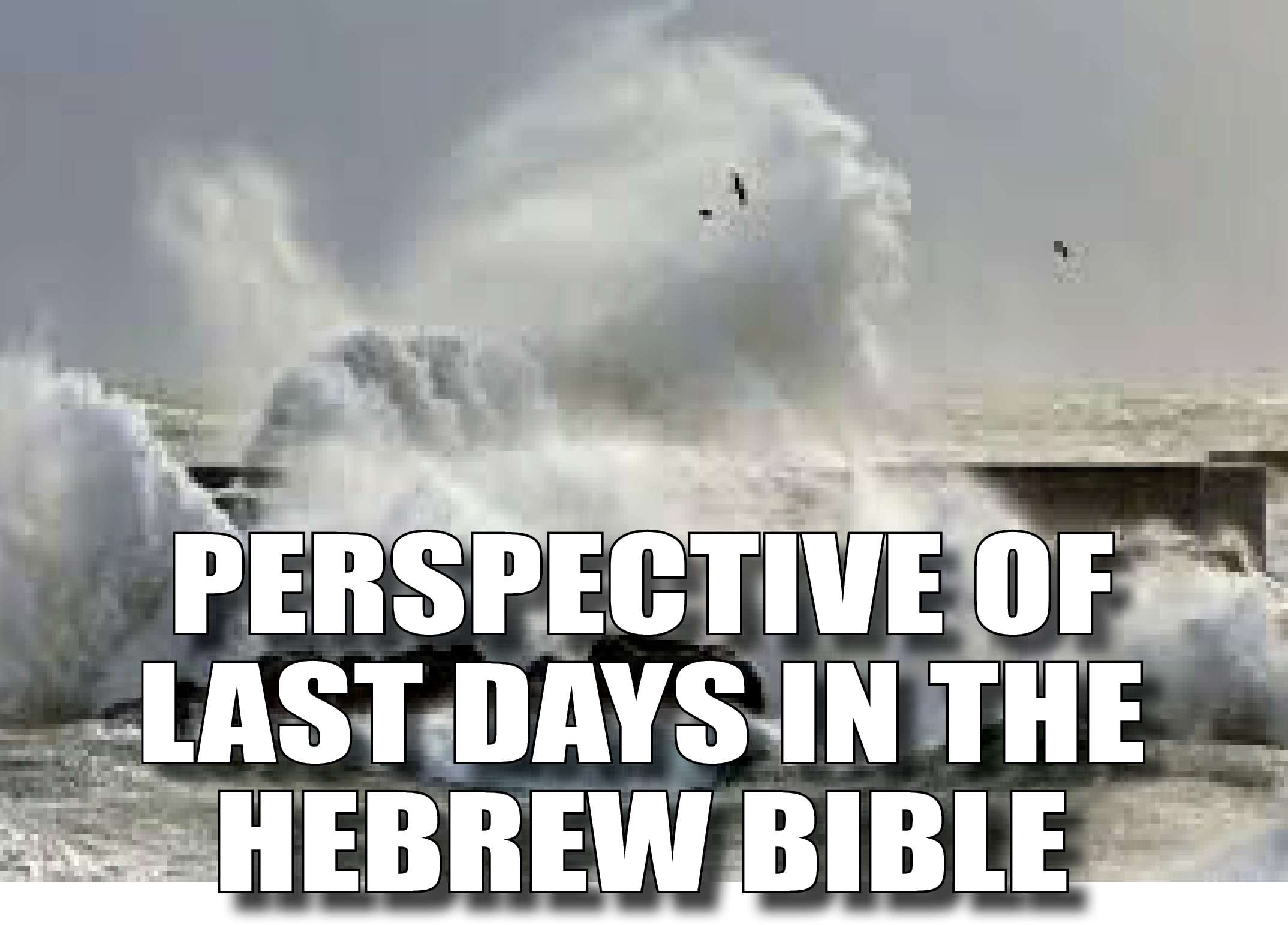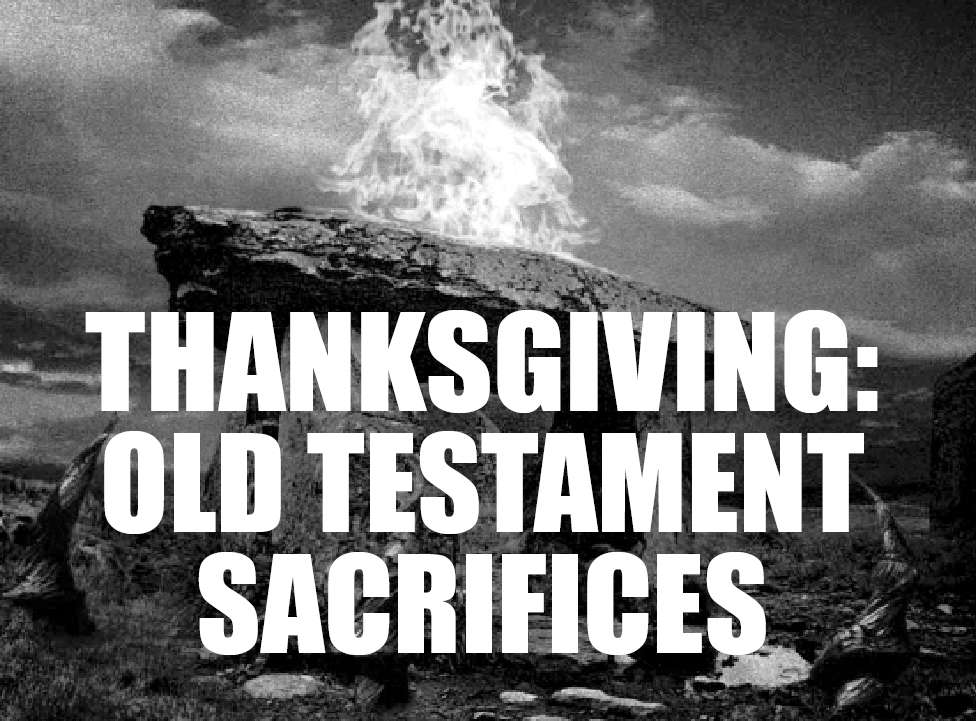

Perspective of Last Days in the Hebrew Bible
Dr. K. B. Georgekutty
The Hebrew language has limited words. Each word in its context may have varied meanings. The concept of last days is an inferring from the Hebrew expression b’aharîthayymîm, which may better translate as “latter days”. Similar expressions are bayyômhahû "in that day", and yômyhwh “day of the Lord.” These expressions are used not for present days, nor for past. Obviously it is used for an expected future day, which may lead us into a comparatively self-enclosed circle of ideas. This is supported by the constant bayyômhahû, "in that day”, where the demonstrative pronoun cannot be explained from the context. It is generally admitted that this circle of ideas was not created by the writing prophets, but was already present in popular belief, though its origin is dubious. It is taken for granted in the polemics of pre-exilic prophets, and is obviously deeply embedded in popular belief. The expectation of a day of Yahweh rests on the important presupposition that Yahweh is confessed, i.e., that there is a knowledge of His might, of His readiness to save and of His judicial power. It may point to the expected general future (Deut. 31:29), or to the eschaton as R L Harris says (Harris, R. L., "The Last Days in the Bible and Qumran," in Jesus of Nazareth Savior and Lord,).
Characteristics of b’ahrîthayymîm: It is, first of all, a dynamic hope; i.e., it is a hope in God more than in the future. The most fundamental idea in Hebrew “b’ahrîthayymîm” is ‘the LORD who comes’. The LORD will finally visit His people in both judgment and salvation. Behind this understanding is the historical experience of divine visitations. The LORD came down to deliver Israel from Egypt and to make them His people (Deut. 33: 2, 5), and visited His people with judgment as well as deliverance (Mic 1:3). This same LORD will finally visit His people to bring them into the fullness of His salvation (Zech.14:3, 5; Isa 29:6; 35:4). This visitation may include punishment of the wicked (Isa 26:21, 63; 1-6), and salvation to the gentiles as well (Isa. 66:18, Zech 2:10f). Thus the Hebrews' understanding of the b’ahrîthayymîm was rooted in history, or rather in the LORD who comes in history.The fundamental characteristic of biblical eschatology: the description of the future in terms of known human experience.
Nevertheless, the expectation of a day of Yahweh should not be too hastily related to the more comprehensive problem of Israelite eschatology. In the interests of linguistic sobriety only that should be called eschatological, which really relates to the eschaton, to the final activity of God, either for or against Israel, says von Rad. Now there can be no doubt that the day of Yahweh is often to be taken in this sense.
There are seven significant passages in the Hebrew Bible that talks about “b’ahrîthayymîm”
1. Gen 49:1 And Jacob called his sons and said, “Gather together, that I may tell you what shall befall you in the last days (NKJV)." This passage speaks of the last days of the twelve tribes of Israel. This prediction would be of use to those that came after them, for the confirming of their faith and the guiding of their way, on their return to Canaan, and their settlement there.
2. Deut 31:29: Moses tells the Israelites: "For I know that after my death you will become utterly corrupt, and turn aside from the way which I have commanded you. And evil will befall you in the latter days, because you will do evil in the sight of the LORD, to provoke Him to anger through the work of your hands" (NKJV). God is establishing the Covenant with His people. God promises His people both coming blessings for obedience and curses for disobedience. This prediction is not about the last days of the earth.
3. Jer. 30:24: “The fierce anger of the LORD will not return until He has done it, And until He has performed the intents of His heart. In the latter days you will consider it(NKJV)." If you study these verses carefully, against current thought, the last days of the Jews and their Covenant were upon them. These references begin to line up with the last days of the Old Covenant, not the last days of the world.
4. Jer. 31: 31-34: "Behold, the days are coming, says the LORD, when I will make a new covenant with the house of Israel and with the house of Judah,not according to the covenant that I made with their fathers in the day that I took them by the hand to lead them out of the land of Egypt, My covenant which they broke, though I was a husband to them,says the LORD. But this is the covenant that I will make with the house of Israel after those days, says the LORD: I will put My law in their minds, and write it on their hearts; and I will be their God, and they shall be My people. No more shall every man teach his neighbor, and every man his brother, saying, 'Know the LORD,' for they all shall know Me, from the least of them to the greatest of them, says the LORD. For I will forgive their iniquity, and their sin I will remember no more ..."NKJV.Again, we see the last days of the Old Covenant were upon them in the First Century.
5. Mic. 4:1- 5:2: "Now it shall come to pass in the latter days, That the mountain of the LORD's house shall be established on the top of the mountains,And shall be exalted above the hills;And peoples shall flow to it... NKJV" This prophecy is fulfilled in the last days of the Old Covenant according to Math 2:1-6: Now after Jesus was born in Bethlehem of Judea in the days of Herod the king, magi from the east arrived in Jerusalem, saying, “Where is He who has been born King of the Jews? For we saw His star in the east and have come to worship Him.” When Herod the king heard this, he was troubled, and all Jerusalem with him. Gathering together all the chief priests and scribes of the people, he inquired of them where the Messiah was to be born. So they said to him, "In Bethlehem of Judea, for thus it is written by the prophet: But you, Bethlehem, in the land of Judah, Are not the least among the rulers of Judah; For out of you shall come a Ruler Who will shepherd My people Israel.' (vv5,6).
6. Jer. 30: 24, 4:8, 23:20; Isa 2:1-2; Mic. 4:1 "The word which Isaiah the son of Amoz saw concerning Judah and Jerusalem. Now it will come about that In the last days the mountain of the house of the LORD, will be established as the chief of the mountains, and will be raised above the hills; and all the nations will stream to it.
7. Joel 2:1-32: “Blow the trumpet in Zion,And sound an alarm in My holy mountain!Let all the inhabitants of the land tremble; For the day of the LORD is coming, For it is at hand: A day of darkness and gloominess, A day of clouds and thick darkness, Like the morning clouds spread over the mountains. A people come, great and strong, The like of whom has never been; Nor will there ever be any such after them, Even for many successive generations.” (NKJV) In the book of Acts we see Peter interprets that this prophecy gets fulfilled in the outpouring of Holy Spirit in the day of Pentecost. “But Peter, standing up with the eleven, raised his voice and said to them, "Men of Judea and all who dwell in Jerusalem, let this be known to you, and heed my words. For these are not drunk, as you suppose, since it is only the third hour of the day. But this is what was spoken by the prophet Joel: 'And it shall come to pass in the last days, says God, that I will pour out of My Spirit on all flesh; Your sons and your daughters shall prophesy, Your young men shall see visions, Your old men shall dream dreams.”(Acts 2:14-22, NKJV).
These various passages regarding the Hebrew understanding of the last day or latter day provides us with different dimensions of hope. Critical scholarship has understood two very different kinds of eschaton in these passages: the prophetic and the apocalyptic. The prophetic hope is entirely historical and earthly. It centres upon the nationalistic hopes of Israel and her triumph over his enemies under the leadership of a Davidic king. This hope did not come true in her history. This tiny, weak nation got subjected to the rule of one pagan nation after another. Under the burden of such experiences and the influence of Persian dualistic ideas, there emerged another kind of hope - the eschatological or apocalyptic. Instead of a historical Davidic king, this dualistic hope posited a heavenly supernatural Son of Man as the messianic ruler. The prophetic hope expects a kingdom to arise within history. The apocalyptic hope expects the kingdom to come from outside of history. This distinction between the prophetic and apocalyptic kinds of hope has played a significant role in the contemporary discussion of eschatology.Yet there is another prominent dimension that can be derived from the Hebrew Bible that is ethical. Now we will have a brief look at those three dimensions.
1. Prophetic Hope
b’ahrîthayymîm " in itself has no fundamental eschatological significance but refers only to a period of time in the indeterminate future (Gen. 49:1; Numb. 24:14; Deut. 31:29). It is used to designate the final period of time when God's kingdom of peace and blessedness will be realized (Isa. 2:2-4) and Israel will be redeemed under a Davidic king (Hos. 3:5). Hence the Hebrew Bible’s hope may properly be designated as a historical hope. It has its setting within history and is viewed as the final term of LORD's acting in history. The biblical perspective does not allow for the sharp disjunction between "history" and "beyond history" as it is often found in contemporary theology. “The cleavage between history and eschatology in the OT is never radical, for the God who will reveal Himself by a grandiose theophany in the eschatological consummation has already manifested Himself and does not cease manifesting Himself in the course of history. Therefore all historical events in redemptive history are already charged with eternal significance” says E Jacob.
The expectation of a day of Yahweh applies to an event in Israel's history which does not imply the inauguration of the last time. Prophets were simply prophesying a catastrophe or a deliverance which will take place in conceivable time. There is an instructive example in Lamentations 1:21: "Thou hast brought the day which thou didst proclaim." The overthrow of Jerusalem was a day of Yahweh. It is now past, history rolls on and one can look back upon it. Ezekiel speaks similarly (34:12) of the day of Yahweh as one which belongs to history. Ezekiel here uses the same expression from nature mythology as that used by Zephaniah (1:15) and
Joel ( 2:2) in relation to the "coming" day.
Hence we can say, the doctrine of the Hebrew Bible concerning the end of the world, denoted by the use of the phrase "b’ahrîthayymîm" is applied evidently to a conceivable time in history, or perhaps the consummation of the Jewish economy by the introduction of the Messianic era (Isa. 2:2; Mic. 4:1).
2. Eschatological Hope
The definition of eschatology and the use of the term to designate the Hebrew Bible’s hope have been vigorously debated. Some have insisted that eschatology properly refers to a great drama of the end time in which the age of this world ends and a new eternal age of salvation is introduced (Mowinckel). Eschatological redemption means redemption of history. It points to the final redeemed state. The Hebrew hope of the b’ahrîthayymîm, as Harris says, may properly be called eschatological. This eschatological new pattern will happen in two stages:
(a) Israel is restored to the land and enjoys the blessings of God's rule (Ezek. 34-37). After the restoration of the land, an eschatological war with Gog and Magog occurs (Ezek 38-39).
(b) The final redemption of the people is foretold in symbolical way, where God forever dwells among His people, receiving their perfect worship (Ezek. 40-48).
Ezekiel provides the fullest program of the eschatological hope. Israel is to be restored to the land under a Davidic prince, to be converted, and enjoy the blessings of a covenant of peace with God's sanctuary established in their midst forever. After the restoration of Israel under the blessings of God's kingdom, there will occur a final eschatological war. The life-giving river flowing from the temple (Eze.47:12) is redefined in Revelation as the river of life flowing from the throne of God (22:11). Similarly, Isaiah sees a new heaven and a new earth (Isa 65:17, 66:22), but death and sin still exist (65:20). This specifically eschatological prospect is sometimes called the end of days. It is understandable that Daniel did not prophesy the day of Yahweh, but preferred expressions more in keeping with his apocalyptic belief.
3. Ethical Hope
The Hebrew Bible has above all an ethical concern when it talks of the b’ahrîthayymîm. The prophets were not primarily concerned about the future but with God's people in the present. Prophets who promised peace instead of judgment were false prophets (Jer, 14:13-16). Amos rebukes the popular hope of his day, that the Day of the Lord would bring certain salvation to Israel. Instead, that Day will be darkness and not light (Amos 5:18-20). The Day of the Lord will mean judgment for Israel as well as for the Gentiles. Beyond judgment is salvation both for Israel and the Gentiles. The prophetic announcements have as their main concern the divine demand for obedience and faithfulness in light of the total redemptive purpose of God.
Because of the ethical character of the Hebrew hope, the eschatological salvation of Israel is viewed not in particularistic terms but in terms of a converted remnant. Israel as a nation is sinful and doomed. The name of Hosea's son, Lo Ammi, illustrates that Israel as such is no longer God's people (Hos 1:9). The Day of the Lord will mean national doom(Amos 5:18-20, 9:8). "Never again, so far as we know, did a prophet seek to reform the state by direct political action" says, J. Bright. Yet a remnant is to be saved, converted, and restored to the land in righteousness. To the Gentiles is assigned a diverse destiny. Sometimes the prophets anticipate an eschatological war between converted Israel and the Gentiles (Mic 4:11-13; Isa 31:4-9; Ezek 38-39); some-times the Gentiles will serve Israel(Am 9:12; Mic 5:9, 7:16; Isa 45: 14-16); sometimes they are seen as converted and worshiping the God of Israel (Zep. 3:9,20; Isa 2:2-4; 42:6; 60:1-14; Zech :20-23, 14:16-19).


